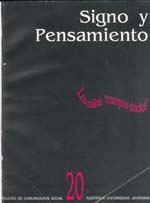Abstract
Este final de siglo ha visto caer muchas cosas. ¿Cómo explicar las reacomodaciones simbólicas de nuestra época? Garcia Canclini propone una nueva forma de percibir el cambio de nuestra sociedad latinoamericana que aún se mueve en al ambigüedad entre tradición y modernidad. Culturas hibridas apunta de demostrar tres hipótesis que el autor desarrolla en el libro: en primer lugar afirma que “la incertidumbre acerca del sentido y el valor de la modernidad deriva no solo de lo que separa a naciones, étnicas y clases, sino de los cruces socioculturales en que lo tradicional y lo moderno se mezcla”. El mercado urbano de las artesanías, el interés de los pintores contemporáneos por retomar a las raíces precolombinas o las hibridaciones ya normales en las formas de apropiación simbólica en la vida cotidiana de algunos de los ejemplos que justifican el uso del término hibridación. Esta realidad apunta Garcia Cancilini, necesita ciencias sociales nómadas, capaces de circular por las escaleras que comunican esos pisos. Y es precisamente este trabajo transbribir la modernización latinoamericana entendida esta como un fenómeno de heterogeneidad multitemporal.This journal is registered under a Creative Commons Attribution 4.0 International Public License. Thus, this work may be reproduced, distributed, and publicly shared in digital format, as long as the names of the authors and Pontificia Universidad Javeriana are acknowledged. Others are allowed to quote, adapt, transform, auto-archive, republish, and create based on this material, for any purpose (even commercial ones), provided the authorship is duly acknowledged, a link to the original work is provided, and it is specified if changes have been made. Pontificia Universidad Javeriana does not hold the rights of published works and the authors are solely responsible for the contents of their works; they keep the moral, intellectual, privacy, and publicity rights.
Approving the intervention of the work (review, copy-editing, translation, layout) and the following outreach, are granted through an use license and not through an assignment of rights. This means the journal and Pontificia Universidad Javeriana cannot be held responsible for any ethical malpractice by the authors. As a consequence of the protection granted by the use license, the journal is not required to publish recantations or modify information already published, unless the errata stems from the editorial management process. Publishing contents in this journal does not generate royalties for contributors.


